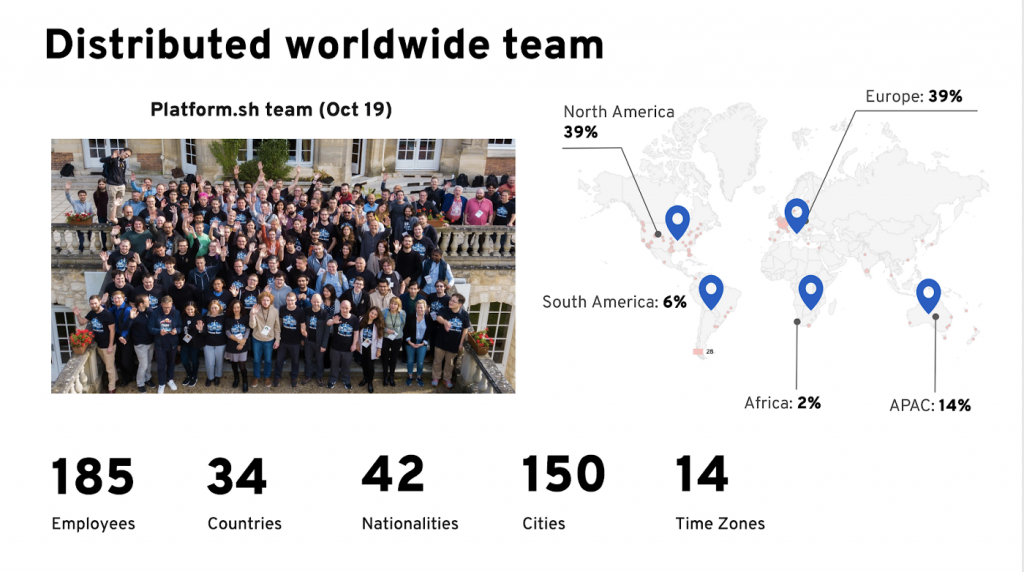To view the original article by Frederic Filloux, please click here.
Platform.sh was designed from the ground up to be managed remotely. Last week, I talked with its CEO, Frederic Plais, about the key challenges: communication, culture, on-boarding of new recruits — and burnout.
One hundred percent of Platform.sh employees and managers work from home. That is not by accident, but by design. The company is specialized in cloud-based solutions for deploying and maintaining large fleets of websites and apps. (In case you wonder, “.sh” is the top-level domain for Saint-Helena, Ascension and Tristan da Cunha, three isolated British territories in the South Atlantic). As an example, the company reorganized, standardized, and made manageable a hodgepodge of 1600+ websites for the University of Missouri.
Platform.sh was created in 2010 by Frederic Plais, a French entrepreneur, and two co-founders Damien Tournoud (CTO) and Ori Pekelman (CPO). Today, Platform.sh is well-funded ($47m including a $34m Series C in 2018); it has 6000 customers, many of them accessing the platform in a self-service mode, and it is growing fast thanks to an implacable, globally distributed organization.
Today the workforce looks like this:

As told by Frederic Plais, who now lives in San Francisco, this extreme structure is rooted in a single issue experienced by scores of startups: finding talent.
“Shortly after we started the company, we were struggling to recruit the right people. We were all in Paris at the time, our portfolio of customers was already global but we were little-known, and the kind of people we wanted were attracted by cloud solutions’ top players or fancy startups like Blablacar or Criteo. To us, it was a matter of survival when we decided to open up and start recruiting abroad. It changed everything.”
“Today, everybody wants to work for us. Last year, we recruited 80 people and we got 14,000 applications, which is about 175 resumés per position. That’s an incredible talent pool!”
In addition, the CEO explains, the company didn’t spend much on spotting the right people, only about $10,000~$15,000 thanks to savvy use of job boards (depending on the position to fill: either LinkedIn, GlassDoor or StackOverflow).
The decision to rely on global recruiting had some interesting consequences on the impact of the workforce:
• The average age is about 37 years old, way older than in a conventional startup, with several people more than 50 years-old who bring a unique experience.
• A low turnover of employees: ~2% per year vs. 10~15% in a startup operating in a competitive environment and about a third in the SaaS or PaaS business.
Every component of the company seems to benefit from this fundamental DNA: growth is much easier and the management is not distracted by the logistics tied to expanding the premises, office planning, or managing all sorts of amenities. Growing from 150 to 300 is relatively easy — as long as the bedrock is solid.
From a cost perspective though, the savings on the workspace are offset by travel costs. Platform.sh organizes one all-hands gathering every year at a cost of several hundred grand, in addition to smaller meetings in person, either on a need-to or regular basis.
“The real deal is on staff cost. That’s where our business model is unbeatable. While we take care to pay a bit above local market wages to remain attractive, I’d say our salary costs are 30 percent less than in France, and 50 percent less than in the Bay Area”, says Frederic Plais.
Building such a well-oiled organization doesn’t happen overnight. Actually, it takes years in the making and relies on one key ability: writing. To make his point, Frederic Plais is quick to refer to the ultimate handbook for remote management put together by his competitor GitLab: the equivalent of 5000 pages of explanation, references, processes, etc.
“You need to write down absolutely everything, from the start”, says Frederic Plais, “and your management must be good at writing. We did it internally without the help of any consultant. You need to detail the culture, the underpinnings of the company as well as going deep into every process. The sooner you start doing this, the farther you go. Everybody must be able to find a reply to any question they might have. Going from an oral culture to a written one requires a lot of work and discipline”.
Main Challenges: Communication, Culture, and Onboarding
I then asked him about the key issues about managing a distributed company.
“The first one is communication. The manager must overcommunicate but at the same time be trusting. Remote management is not for ‘petit chef’ [petty boss]. The manager must find the right balance between asynchronous and synchronous communication. The natural tendency is to spend hours on video calls. They must be kept for decision-making and crisis management. The bulk must be done via Slack or Mattermost [an open-source Slack alternative] with multiple channels and up-to-date resources. The productivity of the team depends on the way communication is organized and managed.”
“The second challenge is to foster and preserve a robust culture. Again, this is achieved largely by writing things down. I will stress it again: it is essential to have people with strong writing skills in the organization. A key element is creating a safe environment. If people start to exchange in a harsh way, you can’t build trust. Everyone is entitled to ask any question and ask for any kind of help. An aggressive genius can be toxic. Again, we codified everything. We defined rules for courtesy and explained how to address different channels for different needs. Managing culture is HR’s job — and ours are excellent — while managing competencies is left to managers.”
“The third critical component is the onboarding process of new recruits. It was the last we cracked… On her first day, the person you just hired finds herself on Slack. She must know what to do and not feel lost. We settle for an eight-week-long integration process during which the newcomer will be exposed to every management unit of the company, the most important being customer success [whose manager is located in Finland]. The new staffer will then be able to understand the product and will have the answers for customers. At some point, we will meet in person. But it could be a year before I personally see a new employee…”
Two issues remain to be solved, or at least improved at Platform.sh.
One is the recruitment of young talent. Working remotely requires a certain degree of maturity and discipline. This is not the path to recommend at the start of a career. “We are not dogmatic. We might open small offices for our SDRs [Sales Development Representatives], which is typically an entry-level job, to allow young staffers to work together…”
A more critical issue unfolded over time: the work-life balance. During one yearly gathering, the management team was surprised to see many staffers willing to talk about burnout and saw several of them had gained significant weight. That’s the flip side of the coin: if everybody chooses remote working for the freedoms it offers, putting a boundary between work and personal life remains tricky. That too wasn’t easy to address, explains the CEO: “Again, we tried to define and catalog everything: an action plan with access to coaching, an explicit right to disconnect, but it remains a serious issue…”
As a core principle, Platform.sh will never deploy any form of virtual time card or any monitoring system. But in the same way that a smartphone user can access her screen time and look at any excesses, it could make sense to offer such a system for remote workers as long as the employer can’t access it.
When he’s on Zoom with his staff — usually six or seven 30-minutes sessions every morning between 6am and 1pm — Frederic Plais has his stationary bicycle in the background to send a message… Even if he himself admits to barely disconnecting.
